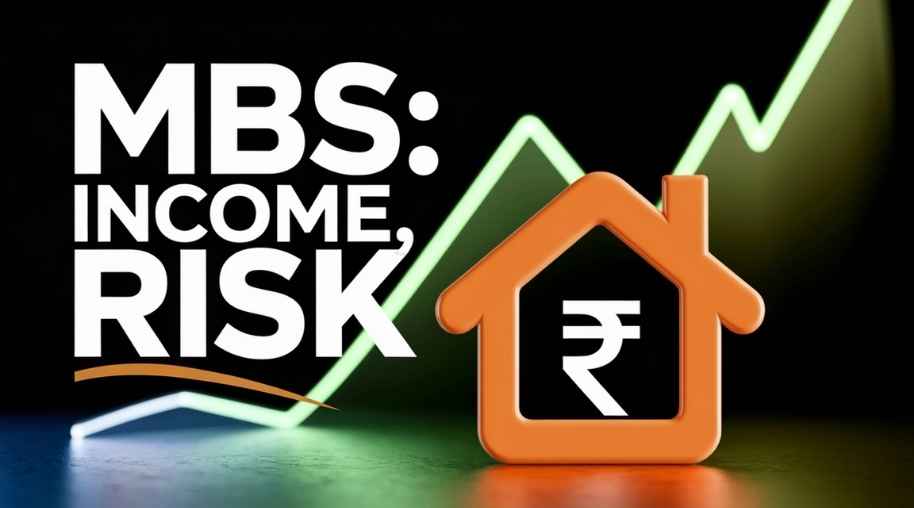MBS Full Form -Mortgage Backed Securities
by Shashi Gaherwar
0 2392
Mortgage-Backed Securities (MBS): Definition, Types, Benefits, and Risks
Introduction
Mortgage-Backed Securities (MBS) play a significant role in the financial market, allowing investors to gain exposure to real estate loans while providing liquidity to lenders. These securities have been a key component of the bond market, but they also contributed to the 2008 financial crisis. Understanding MBS is essential for investors, financial professionals, and anyone interested in real estate-backed investments.

What are Mortgage-Backed Securities (MBS)?
Mortgage-Backed Securities (MBS) are fixed-income investment products that represent claims on the cash flows from pools of mortgage loans. When homeowners make monthly mortgage payments, these payments are passed on to investors who own MBS. These securities are created when banks or financial institutions bundle mortgage loans and sell them as tradable assets in the secondary market.
How MBS Work:
- Origination: A bank or mortgage lender issues home loans to borrowers.
- Securitization: These loans are pooled together and sold to government agencies or private financial firms.
- Issuance: The pooled mortgages are converted into MBS and sold to investors as fixed-income securities.
- Cash Flow Distribution: Investors receive interest and principal payments from homeowners' mortgage payments.
Types of Mortgage-Backed Securities
There are several types of MBS, categorized based on structure and issuer:
- Pass-Through Securities:
- The most common type of MBS.
- Investors receive a proportional share of monthly mortgage payments.
- Cash flows pass through directly to investors without additional structuring.
- Collateralized Mortgage Obligations (CMOs):
- More complex than pass-through securities.
- Loans are divided into tranches with different risk and return levels.
- Investors can choose tranches based on risk preference.
- Agency MBS:
- Issued or guaranteed by government-sponsored enterprises (GSEs) like Fannie Mae, Freddie Mac, and Ginnie Mae.
- Considered lower-risk investments due to government backing.
- Non-Agency (Private-Label) MBS:
- Issued by private financial institutions.
- Higher risk due to the lack of government guarantees.
- May include subprime mortgages or other riskier loans.
Benefits of Investing in Mortgage-Backed Securities
- Steady Income Stream: MBS provide investors with regular payments from mortgage borrowers, making them attractive for income-seeking investors.
- Diversification: Adding MBS to an investment portfolio can help diversify risk, especially in fixed-income investments.
- Government Backing for Agency MBS: Agency-backed MBS offer lower risk because they are supported by government agencies like Fannie Mae and Ginnie Mae.
- Liquidity in the Mortgage Market: MBS help financial institutions free up capital by selling mortgage loans, allowing them to issue more home loans.
Risks Associated with Mortgage-Backed Securities
- Prepayment Risk:
- Homeowners may refinance or pay off their mortgages early, reducing expected returns for investors.
- Lower interest rates can trigger more prepayments.
- Interest Rate Risk:
- Rising interest rates can lower the value of existing MBS.
- Higher rates discourage refinancing, affecting cash flow predictability.
- Credit Risk:
- Non-agency MBS are subject to borrower defaults.
- In economic downturns, default rates may increase.
- Market Liquidity Risk:
- During financial crises, MBS liquidity can decrease, making them harder to sell.
- The 2008 financial crisis demonstrated how MBS liquidity issues can impact global markets.
The Role of MBS in the 2008 Financial Crisis
MBS were a major factor in the 2008 global financial crisis. Banks issued subprime mortgages to borrowers with poor credit histories, leading to high default rates. When these risky mortgages were securitized and sold as MBS, investors suffered significant losses as defaults increased. This event highlighted the risks associated with poorly underwritten mortgage-backed securities and led to stricter regulations in the financial sector.
How to Invest in Mortgage-Backed Securities
Investors interested in MBS can access them through various channels:
- Direct Investment in MBS:
- Institutional investors or high-net-worth individuals can buy MBS directly.
- MBS Mutual Funds & ETFs:
- Funds that specialize in MBS provide diversified exposure without direct ownership.
- Examples include Vanguard Mortgage-Backed Securities ETF (VMBS) and iShares MBS ETF (MBB).
- Real Estate Investment Trusts (REITs):
- Mortgage REITs invest in MBS and distribute earnings as dividends.
- Examples include Annaly Capital Management (NLY) and AGNC Investment Corp (AGNC).
Mortgage-Backed Securities (MBS) are an essential part of the financial market, providing investors with fixed-income opportunities while supporting liquidity in the mortgage sector. While they offer benefits such as regular income and diversification, MBS also come with risks, including interest rate fluctuations and prepayment uncertainty. Understanding the mechanics of MBS, the different types available, and the potential risks involved is crucial for making informed investment decisions. Whether you are a seasoned investor or a newcomer to fixed-income securities, MBS can be a valuable addition to a well-balanced portfolio when approached strategically.
Further Learning Resources
If you’re passionate about building a successful blogging website, check out this helpful guide at Coding Tag – How to Start a Successful Blog. It offers practical steps and expert tips to kickstart your blogging journey!
For dedicated UPSC exam preparation, we highly recommend visiting www.iasmania.com. It offers well-structured resources, current affairs, and subject-wise notes tailored specifically for aspirants. Start your journey today!

Share:









Comments
Waiting for your comments